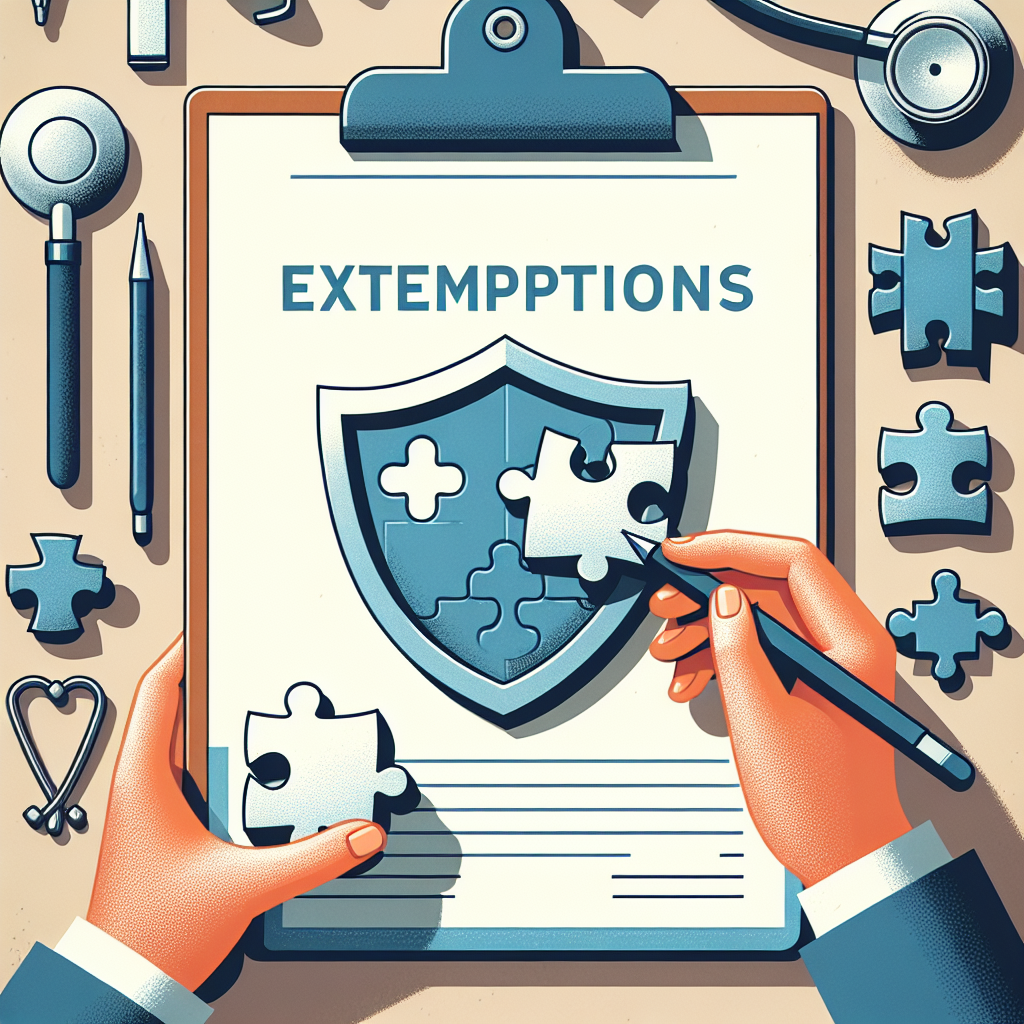Filed under Health Insurance on
"Understanding Health Insurance Coverage Exemptions"

When navigating the complex world of health insurance, understanding the intricacies of coverage exemptions can seem daunting. Yet, these exemptions play a crucial role in maintaining financial stability and ensuring you obtain the necessary healthcare services without unnecessary burdens. Whether you're new to health insurance or simply seeking to deepen your understanding, this guide will provide clarity and insight.
What Are Health Insurance Coverage Exemptions?
Health insurance coverage exemptions are specific circumstances that allow individuals to avoid paying penalties typically associated with not maintaining the minimum essential coverage as mandated by various regulations, like the Affordable Care Act (ACA).
Types of Exemptions
Health insurance coverage exemptions can broadly be categorized into several types:
- Hardship Exemptions: These apply when individuals face circumstances that make it challenging to obtain coverage. Examples include homelessness, eviction, or facing domestic violence.
- Income-Related Exemptions: Available to individuals whose income falls below the federal tax filing threshold, making health insurance financially inaccessible.
- Membership Exemptions: Relating to specific affiliations, e.g., being a member of certain religious sects opposed to insurance benefits or being incarcerated.
- Short-Gap Exemptions: Apply to those uninsured for less than three consecutive months within a year.
Why Are Health Insurance Coverage Exemptions Important?
Understanding health insurance coverage exemptions is crucial for several reasons. Primarily, they provide financial protection by alleviating the need to pay hefty penalties if you genuinely cannot maintain insurance coverage.
Exemptions also ensure that during unexpected life changes—like career shifts or health emergencies—individuals can prioritize immediate needs without added financial strain. Essentially, they offer a safety net during periods of uncertainty.
How Do Exemptions Impact Policyholders?
For policyholders, securing an exemption means shifting focus from fulfilling insurance requirements to addressing urgent personal matters. It grants the breathing room necessary to stabilize one's financial situation before re-engaging with the health insurance market.
Furthermore, exemptions highlight the flexibility within the healthcare system, demonstrating an understanding that life circumstances aren't one-size-fits-all.
How to Apply for Health Insurance Coverage Exemptions
Applying for health insurance coverage exemptions is a systematic process. Here’s a step-by-step guide:
- Identify Your Exemption Type: Understand which category your situation falls under—hardship, income-related, membership-related, or short-gap.
- Gather Necessary Documentation: Collect relevant documents like financial records, eviction notices, or a statement from your religious sect.
- Complete the Application Form: This can often be done through your state’s health insurance marketplace or through the federal marketplace website.
- Submit Your Application: After completion, submit your application along with all supporting documents.
- Await Decision: This process can take some time. Once reviewed, you will be notified of the decision.
Tips for a Successful Application
- Accuracy: Double-check all details and ensure accuracy to avoid delays or denials.
- Timeliness: Submit applications as soon as possible to prevent lapses in coverage.
- Seek Assistance: Don’t hesitate to consult with insurance professionals or use online resources if you need help.
Common Misconceptions About Health Insurance Coverage Exemptions
Many people hold misconceptions about health insurance coverage exemptions, leading to potential pitfalls. Let’s debunk some common myths:
Myth 1: Exemptions Are Difficult to Obtain
While the process can seem rigorous, with the right documentation and circumstances, securing an exemption is quite feasible. Many people are eligible but unaware of their options.
Myth 2: Exemptions Are Only for Extreme Hardships
Exemptions cover a broader range of situations than commonly believed. Even short-term situations, like brief periods of unemployment, can qualify you for exemption.
Myth 3: Exemptions Offer Full Insurance Benefits
It's important to note that exemptions waive the penalty; they do not provide actual health insurance benefits. Coverage remains necessary whenever possible for access to healthcare services.
Recent Trends and Changes in Health Insurance Coverage Exemptions
The landscape of health insurance coverage exemptions is ever-evolving. Policy changes and societal trends continue to shape the availability and applicability of different exemptions.
Policy Adjustments
Recent years have seen changes aimed at simplifying the exemption process and expanding eligibility. For instance, several administrations have adjusted the criteria for what qualifies as a hardship.
Impact of COVID-19
The COVID-19 pandemic brought about significant temporary adjustments to health insurance coverage exemptions. With increased unemployment rates and financial strain, governments introduced new exemptions catering to individuals affected by the pandemic.
Expert Opinions on Health Insurance Coverage Exemptions
Experts highlight the importance of staying informed about potential exemptions, especially in an unpredictable economy. According to health policy analysts, leveraging exemptions strategically can aid in financial planning and ensure access to healthcare when it’s most needed.
Moreover, experts suggest that understanding and utilizing exemptions could lead to more tailored insurance solutions and policy flexibility, fostering a more inclusive healthcare system.
Conclusion
Health insurance coverage exemptions are vital tools within the healthcare system, providing much-needed relief and flexibility to individuals during times of need. By understanding what these exemptions entail, exploring eligibility, and adeptly navigating the application process, individuals can make informed decisions that positively impact their financial and physical well-being.
Whether you are facing a temporary financial hurdle or a significant life change, knowing about health insurance coverage exemptions can provide a crucial safety net, guiding you toward stability and peace of mind.
Remember, the key is to stay informed and proactive in assessing your eligibility for exemptions, ensuring that you make strategic choices about your health coverage.





